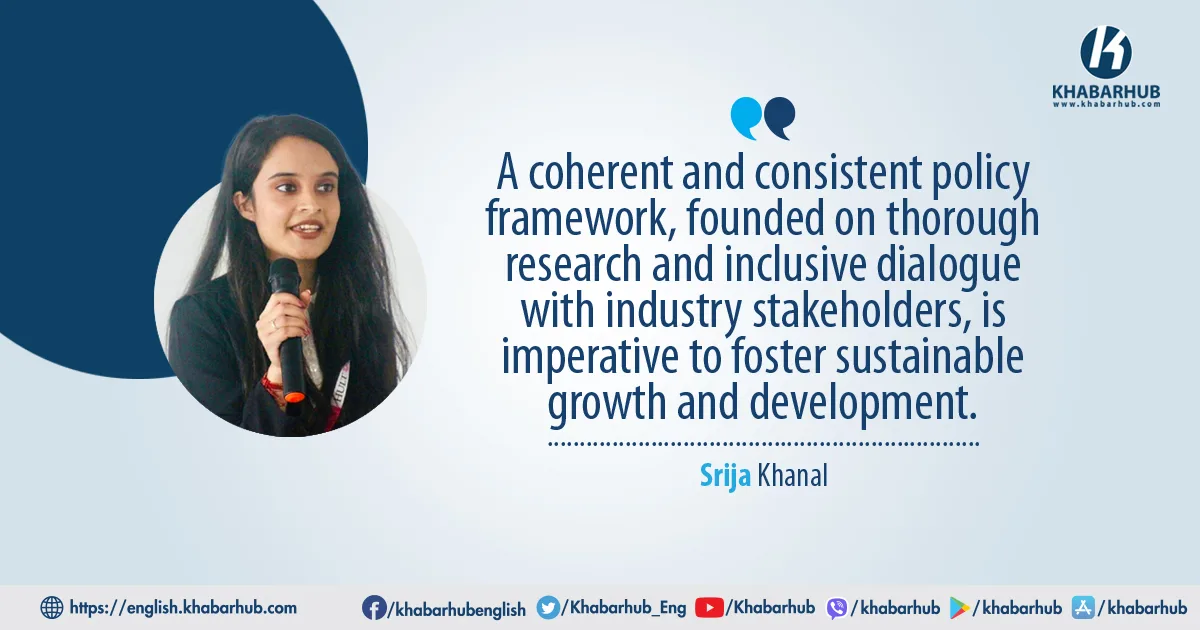In the intricate tapestry of economic development, the stability of governmental policies serves as a cornerstone for sustainable growth.
However, in the context of Nepal, the absence of a steadfast policy framework has cast a shadow over the prospects of industries, particularly the rolling mills.
Nepal’s policy arena has been marked by a persistent state of flux, characterized by frequent shifts devoid of a coherent trajectory.
Nowhere is this volatility more evident than in the realm of trade policies, notably concerning excise duty and taxes on sponge iron and billet imports.
The year 2021 witnessed a seismic alteration in these policies: the abrupt reduction of the 5% customs duty on sponge iron imports to zero, juxtaposed with the imposition of a Rs 2.5 per kg excise duty and 5% import duty levied on billet imports.
This policy whiplash sparked discord within the business community, sowing seeds of uncertainty and dissent.
The haphazard implementation of policies, such as imposing excise duties on raw materials, highlights a systemic issue of inadequate foresight and evaluation of the potential adverse effects on the economy.
The steel produced from billet is deemed superior in quality and is preferred for large-scale construction projects. In 2021, on average, the nation imported around 1 million tonnes per year of billet and 350,000 tonnes per year of sponge iron.
The fallout from these policy somersaults was swift and far-reaching, particularly for the steel industry, where twenty-four iron rod manufacturers grappled with newfound challenges, while only six factories reaped benefits from the altered policies, highlighting stark disparities within the sector.
These factories struggled to compete in pricing, as their products became notably more expensive by NPR 8-10/kg compared to those favored by government benefits.
The economic repercussions were tangible, forcing industries to navigate turbulent waters to survive.
Factory closures, especially prevalent in eastern Nepal, exacerbated economic woes and triggered widespread unemployment, affecting thousands of livelihoods.
Data revealed 30 active steel manufacturing plants in Nepal, employing various production methods, with approximately two dozen relying on imported billet and the remaining half dozen using sponge iron for steel production.
Moreover, the policy disarray bred a culture of cutthroat competition among steel manufacturers.
Factories bereft of governmental largesse found themselves shackled by exorbitant production costs, rendering their products uncompetitive in the market.
This pricing asymmetry further exacerbated the challenges faced by these enterprises, compounding their woes in an already unforgiving economic landscape.
These kinds of policy instability do not only affect the industries but the revenue of the government as a whole.
In hindsight, the policy tumult surrounding Nepal’s steel industry serves as a cautionary tale, underscoring the perils of instability in governmental policies.
As the nation strives to chart a course towards economic prosperity, the imperative for a coherent and consistent policy framework has never been more pressing.
Only through a concerted effort to foster stability and inclusivity within the policy sphere can Nepal unlock its true potential and pave the way for enduring economic growth and development.
Now, the taxation and excise duty rates have again been revised. In the budget of the fiscal year 2024/25, the excise duty on billet has been waived while the excise duty on sponge iron has been increased to 2.5%.
After the replacement bill was announced in 2021, the industrialists left with no options had increased and now the industry worth Rupees 36 billion and providing employment to more than 3500 people is in jeopardy.
This will further exacerbate the long-term effects of industrialization. There were seven smelting factories before the replacement bill, and in the timeframe of 3 years, seven more were added.
The industrialists state that they are now unable to operate melting plants without a consistent customs facility which the government is unable to provide.
A coherent and consistent policy framework, founded on thorough research and inclusive dialogue with industry stakeholders, is imperative to foster sustainable growth and development.
At present, there are 23 industries that are currently operating in Nepal, and 18-19 have installed melting plants that import and melt sponge, pig, and scrap iron into billets.
In conclusion, Nepal’s steel industry serves as a poignant example of the detrimental impact of policy volatility on industrial stability.
The oscillating landscape of governmental regulations, particularly concerning excise duties and import taxes, has not only fostered an environment of uncertainty and discord within the business community but has also led to profound economic ramifications.
The haphazard implementation of policies, such as imposing excise duties on raw materials, highlights a systemic issue of inadequate foresight and evaluation of the potential adverse effects on the economy.
While the citizens experience the immediate consequences, it’s essential to recognize that the government might possess different data or harbor hidden agendas or interests that the people seek to understand and uncover.
A coherent and consistent policy framework, founded on thorough research and inclusive dialogue with industry stakeholders, is imperative to foster sustainable growth and development.
Only through a commitment to stability and inclusivity within the policy sphere can Nepal unlock its true economic potential and pave the way for enduring prosperity.









Comment